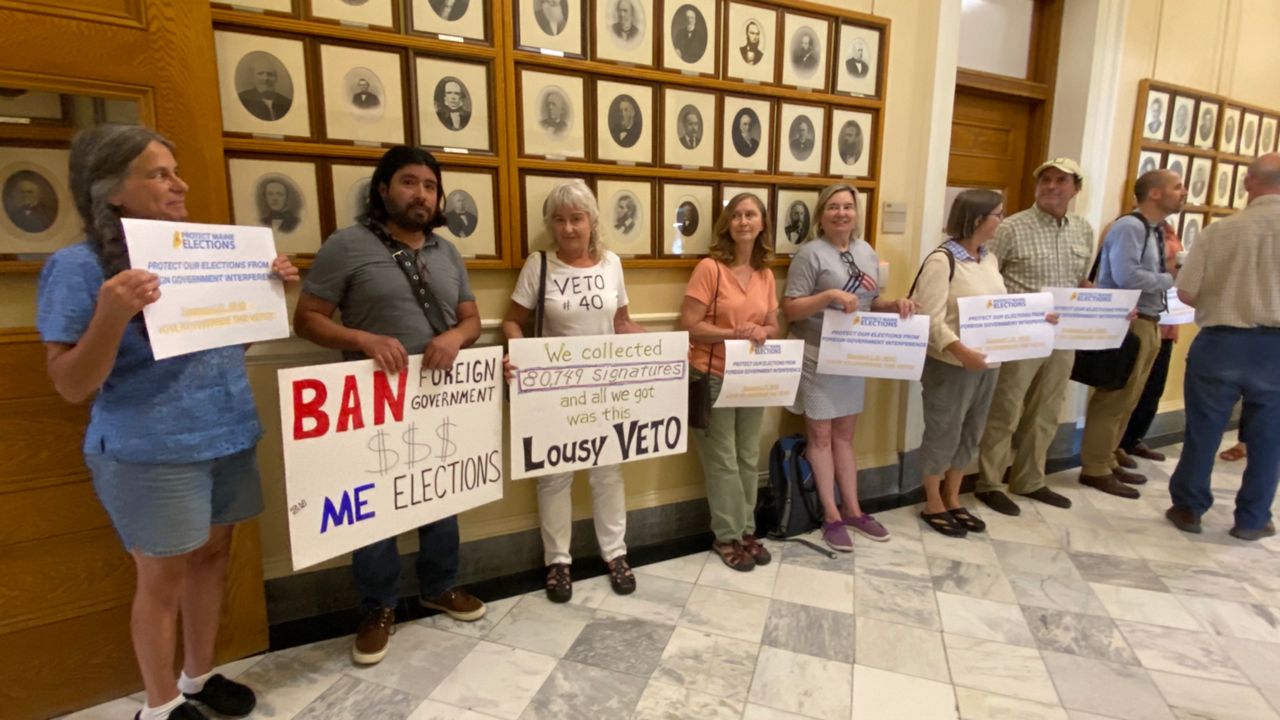Maine lawmakers on Tuesday failed to override two vetoes by Gov. Janet Mills, including her rejection of a bill on farmworker pay and another seeking to restrict foreign government spending on elections.
Mills has now successfully vetoed 41 bills since 2019 without the Legislature overturning her decisions.
The farmworker bill failed on a 61-61 vote in the House, falling well short of the two-thirds needed to override the veto.
The foreign government spending bill override vote failed 73-50 in the House, less than the two-thirds needed. Because it is a citizen initiative, it will now go before voters in November.
Prior to the House vote, supporters of the foreign government spending bill rallied in the State House Hall of Flags in hopes of gaining support for a veto.
Rachel Herbener of Belfast held a sign that said, “We collected 80,749 signatures and all we got was this Lousy Veto."
“I was very upset,” she said. “The bill had large bipartisan support and it was vetoed by Janet Mills.”
The bill seeks to prevent businesses in which foreign governments have at least a 5% stake from spending money on Maine referendum elections. It was launched just after the 2021 vote on the Central Maine Power corridor.
The campaign attracted a record $90 million in spending, more than $20 million of which came from Hydro Quebec, which is owned by the Canadian government.
Mills vetoed the citizen initiative saying it could restrict the free speech of Maine-based businesses that have foreign investors and that it raises serious First Amendment issues.
“Foreign actors have, and will, attempt to influence elections in America, but in attempting to protect our citizens from such nefarious actors, we should not create a bureaucratic morass that will entrap and silence otherwise legitimate voices and undermine the fundamental American cornerstones of free speech and free press,” she wrote in her veto letter.
Rep. Nathan Carlow (R-Buxton) said he was “flabbergasted” by the logic Mills used in issuing the veto and that nine other states have already adopted similar measures.
“The central pillar of the chief executive’s veto is the supposition that foreign governments like Russia, China and Iran, and the foreign corporations under their control, are guaranteed Constitutional right and protections of free speech in this country,” he said during the House debate. “Madame Speaker, if I am to be charitable, that assertion is absurd on its face.”
Mills also vetoed LD 398, which seeks to guarantee that farmworkers make minimum wage and puts limits on forced overtime.
She wrote that she was reluctant to veto the bill because she supports “a minimum wage for farm workers.”
She said that last-minute changes to the bill raised questions about who is covered under the legislation and that she will reestablish a work group to clarify the provisions.
“Out of this work, I believe we can arrive at a shared understanding of how to implement a minimum wage bill for farmworkers,” she wrote, adding that she will then present a new bill for consideration next year.
During a brief House debate Tuesday, Rep. Amy Roeder (D-Bangor) disagreed with the governor’s characterization that the bill was rushed or flawed.
“The bill represented a very modest step toward moving the people that feed us, that put food on our table to having protections” that all other Maine workers enjoy, she said.
A couple of Republicans stood to thank the governor, including one who represents farmers in Aroostook County.
The Maine AFL-CIO issued a sharply worded statement following the veto.
“This veto carries on the historical stain and stench of exploitation and racial exclusion,” said Cynthia Phinney, president of the labor union. “It’s embarrassing and shameful. Farmworkers are some of the hardest working people in our nation and they deserve fair and equal treatment.”
And while the farmworker bill may come back next year, it will now be up to voters to decide the foreign campaign spending measure in November.
Herbener thinks it will be a challenging campaign for supporters, including the 400 volunteers who gathered signatures to put the issue before the Legislature.
“It’s a huge burden on regular folks, regular citizens who want to have a voice in our future,” she said. “We don’t have money to fight these large corporations.”



